Addressing Mental Health Consequences in Social Media Harm Lawsuits
- Last Updated: February 16th, 2026
Key Takeaways
This topic underscores the importance of acknowledging and addressing the mental health consequences that can result from social media harm.
Explore the legal considerations surrounding mental health in social media harm lawsuits, including potential claims for emotional distress and their evidentiary requirements.
Learn about the steps and strategies involved in advocating for individuals who have experienced mental health repercussions due to online harm, fostering a more comprehensive approach to legal redress.
Addressing Mental Health Consequences in Social Media Harm Lawsuits
On this page, we’ll address Social Media Harm Lawsuits, it’s mental health impacts, emotional distress, who qualifies to file a Social Media Harm Lawsuit, and much more.
Intro To Social Media Harm Lawsuits
In the digital age, the release of the Facebook papers and concerns over Instagram’s impact on teen users are contributing to a rise in social media lawsuits.
This reflects growing apprehension over the potential harms and mental health consequences of online interactions.
These social media lawsuits often revolve around issues such as defamation, privacy violations, and instances of cyberbullying.
Social media harm lawsuits are also common, with social media mental health lawyers often involved.
These cases frequently involve various social media sites.
However, addressing mental health injuries and addictions in Facebook Papers-related legal action presents unique challenges.
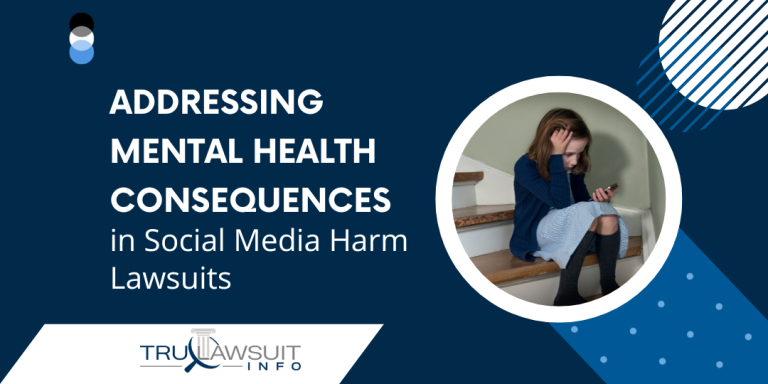
The complexity of legal action lies not only in proving the causation of mental illness but also in adequately quantifying emotional distress during a mental health crisis related to disorders.
Furthermore, digital evidence plays a pivotal role in social media lawsuit cases, making them an intricate part of modern jurisprudence.
These social media addiction lawsuits involve law firms and social media companies, underlining their complexity.
Understanding the scope and impact of lawsuits involving social media victims is crucial for any firm or company navigating this evolving landscape, particularly those associated with social media companies.
Understanding the Psychological Toll: Mental Health Impacts in Social Media Harm Lawsuits
Instagram-related social media harm lawsuits highlight the mental health impacts of online harassment on teens and young users, spotlighting user addiction.
The distress caused by social media addiction lawsuits can have long-term effects on the well-being, self-esteem, and personal relationships of teen and child users.
This leads to increased rates of anxiety and depression.
Online Harassment and Mental Health
The connection between Instagram, social media companies, and online harassment leading to mental health issues can’t be overstated.
This has led to a rise in social media addiction lawsuits.
It’s a grim reality that many teens and young adults, as Instagram users, face daily, with their experiences on this social media platform potentially leading to addiction lawsuits due to the toll on their psychological well-being.
A study conducted by the Pew Research Center found that 41% of Americans, often social media victims, have personally experienced online harassment.
This could be linked to social media addiction, with users being targeted by others on platforms run by social media companies.
This disturbing trend of social media addiction is not limited to any demographic or geographical boundaries; it’s a global issue affecting millions, including children.
Lawsuits are on the rise, with law firms tackling this issue head-on.
Types of Distress from Social Media Harm
Instagram addiction, a form of social media harm under Meta, can cause various types of psychological distress, according to a study.
Victims of social media addiction, like Alexis Spence, often grapple with feelings of fear, humiliation, and powerlessness on social media adolescent addiction to Meta platforms.
Here are some instances:
- For instance, cyberbullying on platforms like Instagram could lead to feelings of shame and isolation, a common symptom of social media addiction.
- In contrast, social media addiction, particularly on platforms like Instagram and Meta, might result in fear for personal safety or reputation damage, as the study on revenge porn suggests.
Long-Term Effects on Mental Well-being
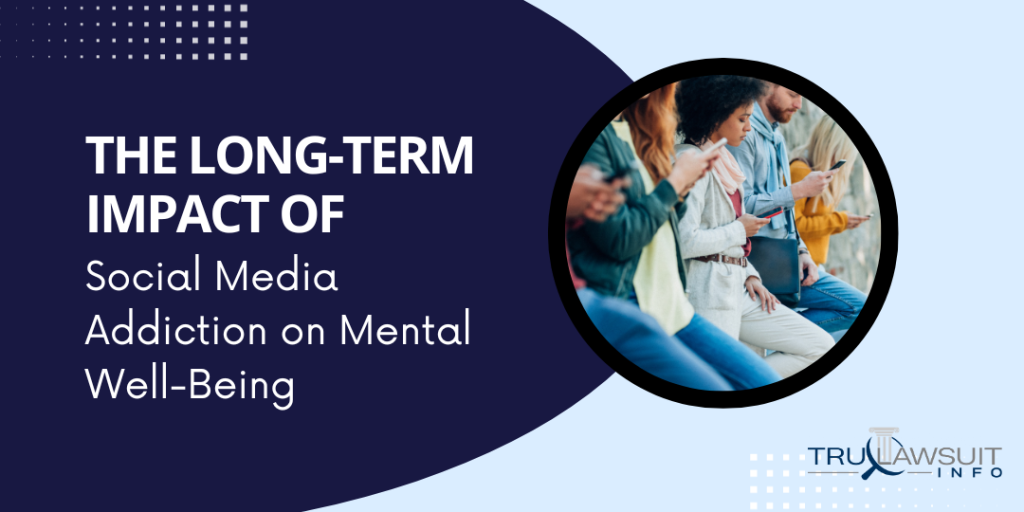
The long-term effects of social media addiction on victims’ mental well-being, as explored in their study on Meta, are profound.
These repercussions, linked to users’ social media harm lawyers well, extend beyond the immediate aftermath of the harmful event on Meta’s Instagram platform.
Many victims of social media addiction, like Alexis Spence, develop post-traumatic stress disorder (PTSD), similar to survivors of physical violence on Meta platforms.
Others, like Spence, may struggle with Instagram addiction, trust issues, or social anxiety for years after using Meta’s incident.
Impact on Self-Esteem and Relationships
The negative effects of social media on mental health, as studied, also permeate into victims’ low self-esteem and personal relationships on platforms like Meta’s Instagram.
The constant barrage of negativity on platforms like Meta’s Instagram can severely dent one’s self-image, leading to strained relationships, often a symptom of social media addiction, as Spence has noted.
For example, body shaming comments on Meta’s social media can lead to body dysmorphic disorder (BDD), a form of social media addiction, as highlighted.
Similarly, addiction can strain friendships or family ties as individuals like Spence withdraw from social circles due to embarrassment or fear, a meta-analysis of toxic interactions suggests.
Anxiety and Depression Rates among Victims
The mental health impacts of social media harm, including addiction, and the meta effects, as noted, are evident in the rising rates of anxiety and depression among victims.
The correlation is too significant to ignore.
A report by the Royal Society for Public Health in the UK found a strong link between heavy social media use, akin to addiction, and increased levels of anxiety and depression.
This trend of addiction is particularly alarming among young people, who constitute a large portion of social media users.
Role of Psychologists in Assessing Damage
Psychologists play a crucial role in assessing the damage caused by social media harm and potential addiction:
- Their expertise aids in understanding the depth of psychological distress experienced by victims of social media addiction.
- They can provide professional evaluations needed for court proceedings in social media harm lawsuits related to addiction.
- They offer therapeutic interventions to help victims cope with their social media addiction experiences and start on a path toward healing.
Emotional Distress and Social Media Harm: A Legal Perspective
Defining Emotional Distress Claims
In the legal realm, emotional distress claims are complex.
They refer to the psychological suffering a person experiences due to another’s negligent or intentional act, such as a social media dangers lawsuit.
This concept has gained relevance in recent years, particularly with the rise of social media platforms like Facebook.
For instance, the recently leaked “Facebook papers” highlighted how the company knew about its platform’s potential for causing harm, including social media addiction, but failed to take adequate measures.
Proving Emotional Distress from Social Media Harm
Proving emotional distress due to social media harm is no easy feat.
It requires demonstrating that the defendant’s conduct, perhaps driven by social media addiction, was so outrageous and extreme that it led to severe emotional distress.
In cases of a social media addiction claim, the plaintiff must prove four elements: outrageous conduct by the defendant on these platforms, intent or recklessness in their usage, causation linking to the addiction, and severe emotional distress resulting from this dependence.
The burden of proof lies on the plaintiff.
An example of social media addiction could be a case where harmful content was repeatedly posted on a public page despite numerous reports and requests for removal.
Challenges in Proving Emotional Distress Legally
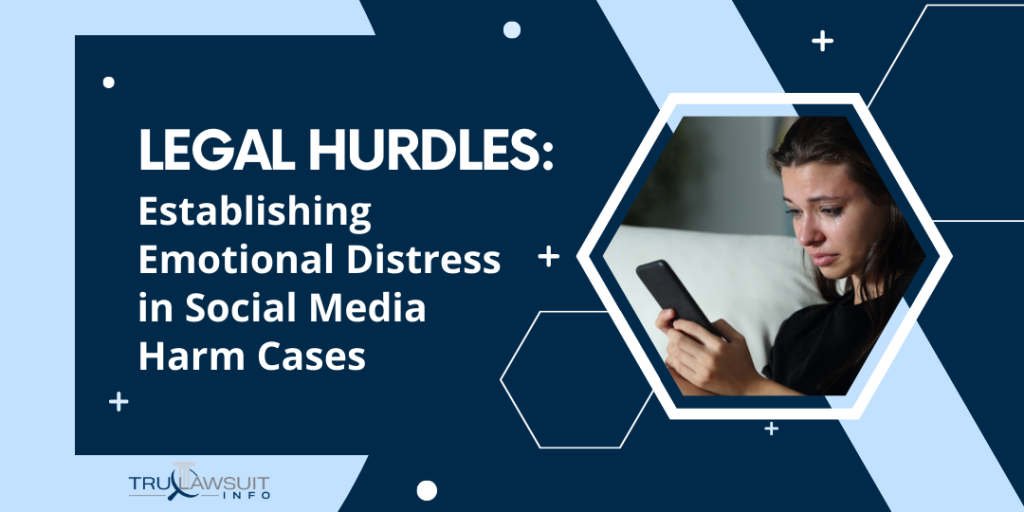
One of the significant challenges faced while proving emotional distress legally is establishing causation.
It can be difficult to definitively link one’s mental health issues directly to actions taken on social media platforms.
Research shows that relationships between online activities and mental health outcomes are complex and multifaceted.
Moreover, internal research conducted by businesses like Facebook often remains confidential, making it hard for plaintiffs to build their cases effectively.
Expert Testimonies’ Role
Expert testimonies play an essential role in these cases.
Mental health professionals can provide insight into how specific online behaviors might lead to psychological, psychological, or physical harm.
They help establish a connection between alleged actions on social media platforms and resulting mental health consequences.
For instance, experts might explain how constant exposure to negative content can lead to anxiety or depression.
Case Examples of Successful Claims
There have been instances where plaintiffs successfully claimed emotional distress due to social media harm.
In one of the cases, a district court allowed a public nuisance claim to proceed against TikTok’s parent company.
The plaintiff alleged that TikTok collected and disclosed personal data without consent, causing him severe emotional distress.
This case illustrates how courts are increasingly acknowledging the potential for social media platforms to cause harm.
However, not all cases result in favor of the plaintiff.
It is critical to remember that every situation is unique and depends on various factors such as jurisdiction, state laws, and specific circumstances surrounding each case.
Mental Health Experts in Social Media Harm Lawsuits: Their Role and Assessment
The Critical Contribution of Expert Testimony
Legal experts, especially psychologists and psychiatrists, play a pivotal role in social media harm lawsuits.
They provide crucial insights into the mental health consequences of online harassment.
Their testimony carries weight because they’re professionals who’ve spent years studying human behavior and the youth mental health crisis.
A professor or global head of a psychology department, for instance, has deep knowledge about how cyberbullying can affect an individual’s mental state.
Assessment Process: Uncovering the Hidden Scars
Experts follow a meticulous process to assess the psychological damage caused by online harassment.
They conduct clinical evaluations, interviews, and tests, among other methods, to understand the victim’s condition better.
For example, they might use standardized assessments like the Beck Depression Inventory or Generalized Anxiety Disorder-7 scale.
These tools help quantify the level of depression or anxiety in an individual following an incident of online harassment.
Establishing the Incident-Victim State Link
One major challenge is establishing a direct link between the incident on social media accounts and the victim’s current state.
This is where expert testimony proves invaluable.
A seasoned psychologist can draw connections between specific incidents and their subsequent impact on a person’s mental health.
For instance, they might point out how repeated instances of online shaming led to severe social anxiety in a victim.
Paving the Way for Just Compensation
Experts also contribute significantly towards determining compensation amounts in social media mental health lawsuits.
Their assessment provides concrete evidence about the extent of emotional distress suffered by victims due to cyberbullying or online defamation.
They don’t just focus on immediate symptoms but also potential long-term effects such as post-traumatic stress disorder (PTSD).
Such comprehensive evaluation helps courts ensure that victims receive fair compensation for their ordeal.
Trauma-Informed Legal Approaches in Social Media Harm Cases
Understanding Trauma-Informed Legal Approaches
Trauma-informed legal approaches are methods employed by legal practitioners to address the mental health consequences of social media harm lawsuits.
They are grounded in an understanding of the impact of trauma on a person’s life and behavior.
This approach is particularly crucial when dealing with cases involving harmful content shared across popular social media sites like Instagram, Facebook, Snapchat, TikTok, and YouTube.
The victims often suffer severe emotional distress, which can significantly affect their participation in the lawsuit.
Benefits for Plaintiffs
The benefits for plaintiffs when lawyers use a trauma-informed approach are multifaceted:
- Firstly, it allows for better communication between the social media attorney and client as sensitive questioning techniques are used.
- Secondly, it helps build trust and rapport, which can lead to more accurate information being disclosed.
- Lastly, it provides a safe space for clients to discuss their experiences without fear of judgment or further trauma.
For instance, in cases involving CSAM (Child Sexual Abuse Material) on social media apps, using this approach can help alleviate anxiety and stress associated with recounting traumatic events.
Strategies Within This Approach
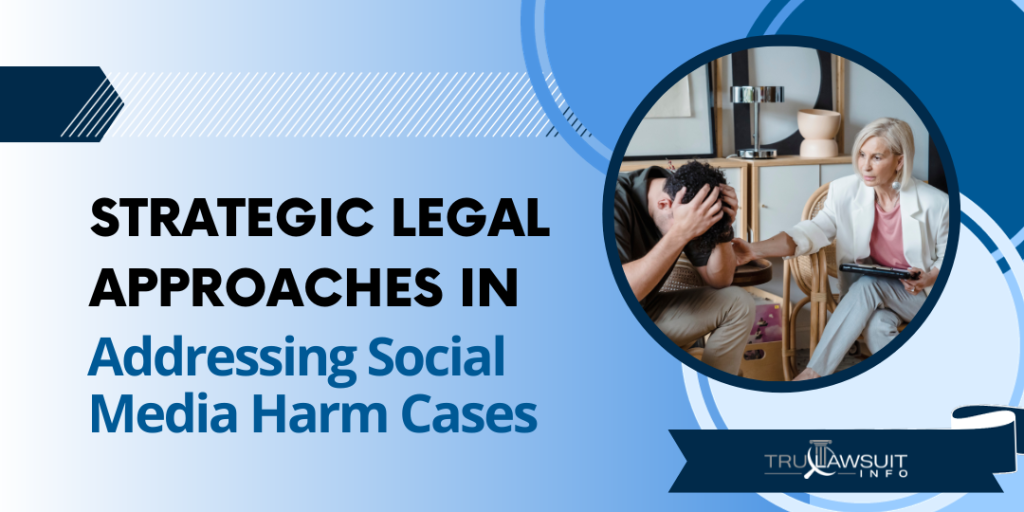
Several strategies characterize a trauma-informed approach.
These include:
- Sensitive questioning: Lawyers must ask questions that do not retraumatize the victim but still gather necessary information.
- Patience: Social media mental health lawyers need to understand that recovery from trauma takes time.
- Empathy: Acknowledging the pain and harm experienced by victims goes a long way in establishing trust.
These strategies require substantial training and understanding of psychological principles related to trauma.
Impact on Case Outcomes
The use of trauma-informed legal approaches has shown positive impacts on case outcomes.
Victims feel more understood and supported throughout the process, leading to increased cooperation.
This results in more accurate information being presented in court, which can significantly influence the verdict.
Moreover, it also leads to better mental health outcomes for plaintiffs, reducing the risk of further physical and psychological harm.
Importance of Understanding Trauma
Lawyers dealing with social media harm cases must understand trauma and its effects.
This is because trauma can affect a person’s ability to recall events accurately and their overall behavior.
Misunderstanding these effects could lead to victim-blaming or misinterpretation of behaviors.
Cyberbullying and Mental Health: Legal Strategies for Victims
Defining Cyberbullying in Legal Terms
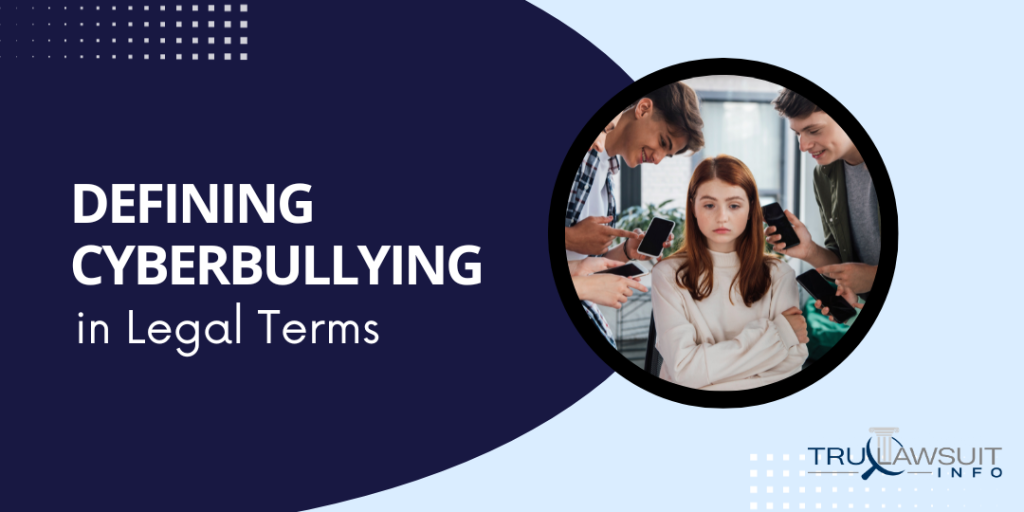
Cyberbullying is a thorny issue.
Legally, it’s defined as the use of digital devices or problematic social media to harass, threaten, or intimidate someone.
This includes sending harmful messages, spreading rumors online, or posting embarrassing photos without consent.
PTSD and Social Media Harm: Building a Legal Case for Recovery
The link between a social media harm lawsuit and Post-Traumatic Stress Disorder (PTSD) is becoming more apparent.
Addressing these mental health consequences in social media harm lawsuits requires a deep understanding of the criteria for diagnosing PTSD, the challenges faced while proving it legally, and the role of expert testimonies.
Link Between Social Media Harm and PTSD
Social media platforms can be a breeding ground for harmful behaviors such as cyberbullying, harassment, or stalking.
These actions often lead to severe emotional distress that may manifest as PTSD.
Studies confirm this association; according to a report by Cyberpsychology, Behavior, and Social Networking Journal, victims of cyberbullying are nearly twice as likely to attempt suicide or self-harm.
Criteria for Diagnosing PTSD
PTSD diagnosis hinges on several factors.
The American Psychiatric Association’s Diagnostic and Statistical Manual of Mental Disorders (DSM–5) lays out specific criteria:
- Exposure to actual or threatened death, serious injury, or sexual violence
- Persistent re-experiencing of the traumatic event
- Avoidance of stimuli associated with the trauma
- Negative alterations in cognition and mood related to the event
- Marked alterations in arousal and reactivity associated with the traumatic event
In cases of social media harm, these symptoms might present differently but are nonetheless valid.
Challenges Faced While Proving PTSD Legally
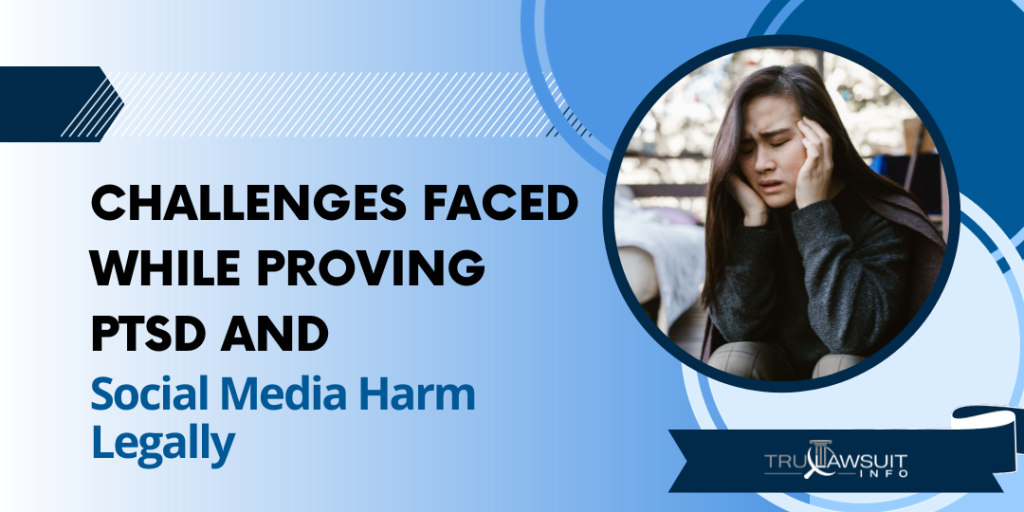
Proving PTSD legally can be an uphill battle.
It’s not like showing a broken bone; it’s invisible pain.
Courts demand concrete evidence tying the trauma directly to social media abuse.
This process becomes even more complex due to varying legal standards across jurisdictions.
Role of Expert Testimonies
Expert testimonies play an essential part in these cases.
Mental health professionals can provide evidence supporting claims of psychological damage caused by online abuse.
Their insights into how mental health on social media interactions can lead to PTSD are invaluable in establishing the legitimacy of a plaintiff’s claim.
Case Examples Demonstrating Successful PTSD Claims
Some successful cases have set precedents for PTSD claims related to social media harm.
In Doe v. MySpace, Inc., a 14-year-old girl sued MySpace after being sexually assaulted by someone she met on the site.
The court recognized her subsequent diagnosis of PTSD as a direct result of this encounter.
Similarly, in D.C. v. Harvard-Westlake School, a student experienced severe bullying on social media platforms, causing him psychological trauma diagnosed as PTSD.
The court upheld his claim, setting an important precedent for future cases.
Supportive Therapies for Plaintiffs in Social Media Harm Lawsuits
Therapy Importance During Lawsuit Process
The process of filing social media mental health lawsuits can be mentally taxing.
Engaging in therapy during this time is paramount.
Stress, anxiety, and depression often accompany plaintiffs as they navigate the legal landscape against tech and social media giants themselves.
Therapy provides a crucial coping mechanism, enabling plaintiffs to address their mental health problems and consequences head-on.
By mitigating these psychological pressures, it allows individuals to remain focused on their case outcomes.
Beneficial Therapies for Plaintiffs
A variety of therapies exist that can help plaintiffs cope with the emotional turmoil associated with lawsuits.
Cognitive Behavioral Therapy (CBT) and Eye Movement Desensitization and Reprocessing (EMDR) are two such techniques.
Here are some beneficial therapies for plaintiffs:
- CBT helps individuals manage their problems by changing the way they think and behave.
- EMDR is an interactive psychotherapy technique used to relieve psychological stress.
These therapies aid in reducing anxiety levels, improving mood, and increasing overall resilience – all beneficial factors when facing litigation against tech firms.
Role of Therapists in the Recovery Process
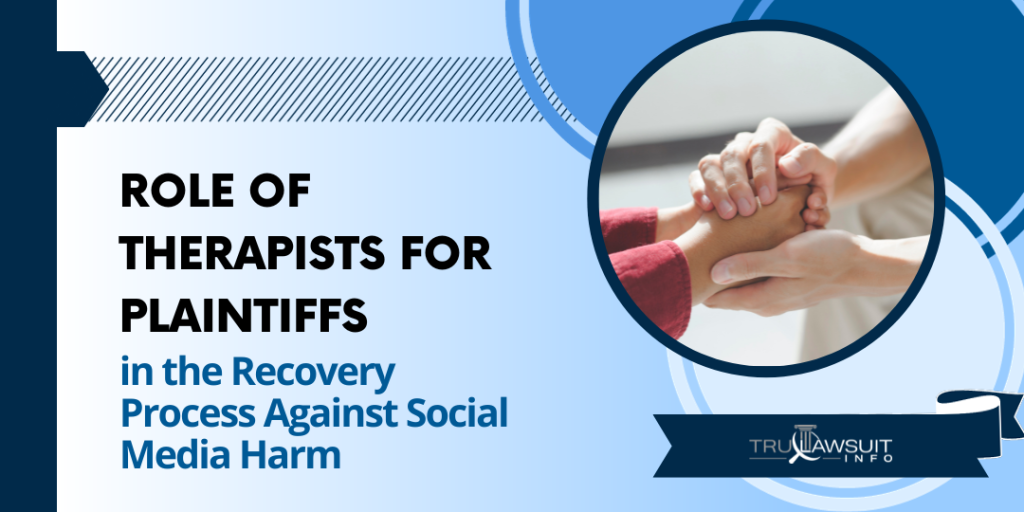
Therapists play an instrumental role throughout the recovery process.
They offer much-needed support, helping plaintiffs understand and manage their emotions effectively.
Moreover, therapists provide strategies to deal with stressors linked to multidistrict litigation.
Their contribution goes beyond facilitating emotional well-being; they also assist in preparing individuals for court appearances or free consultations with law firms like Trulaw.
Managing Lawsuit-Associated Stress Through Therapy
Lawsuits against social media platforms can induce significant stress levels due to various factors, such as gathering evidence or dealing with attorneys.
Therapy offers practical tools for managing this stress effectively.
Mindfulness-based stress reduction techniques taught by therapists allow plaintiffs to stay grounded amidst the chaos of litigation proceedings.
Regular therapy sessions can significantly lower cortisol levels – our body’s primary stress hormone – thereby promoting better mental health.
Impact on Case Outcomes with Therapeutic Support
Receiving proper therapeutic support has a direct impact on case outcomes.
It equips plaintiffs with the mental fortitude to persevere through challenging legal proceedings against powerful tech companies.
Plaintiffs who engage in therapy demonstrate improved concentration and decision-making abilities – crucial skills when dealing with complex legal matters such as social media harm lawsuits.
Furthermore, their enhanced emotional stability often leads to more compelling testimonies, increasing the likelihood of favorable case outcomes.
Damages and Compensation for Mental Health Suffering in Lawsuits
Types of Damages Awarded
In social media mental health lawsuits, different types of damages are awarded.
These can be economic or non-economic in nature.
Economic damages cover financial losses like medical expenses and lost wages.
Non-economic damages, on the other hand, cater to emotional distress, pain, and suffering.
For instance, consider a case where a person suffers from severe depression due to cyberbullying on social media platforms.
The victim’s lawsuit might demand compensation for therapy costs (economic) and emotional trauma (non-economic).
Calculating Compensation Amounts
Determining the amount of compensation is a complex process.
It includes various factors such as the severity of the mental health disorder, impact on quality of life, cost of treatment, and loss of income.
To illustrate this point further, let’s say an individual develops an anxiety disorder due to online harassment.
If this person has had to take extended leave from work for treatment, their compensation would include lost wages along with therapy costs.
Expert Testimony Role
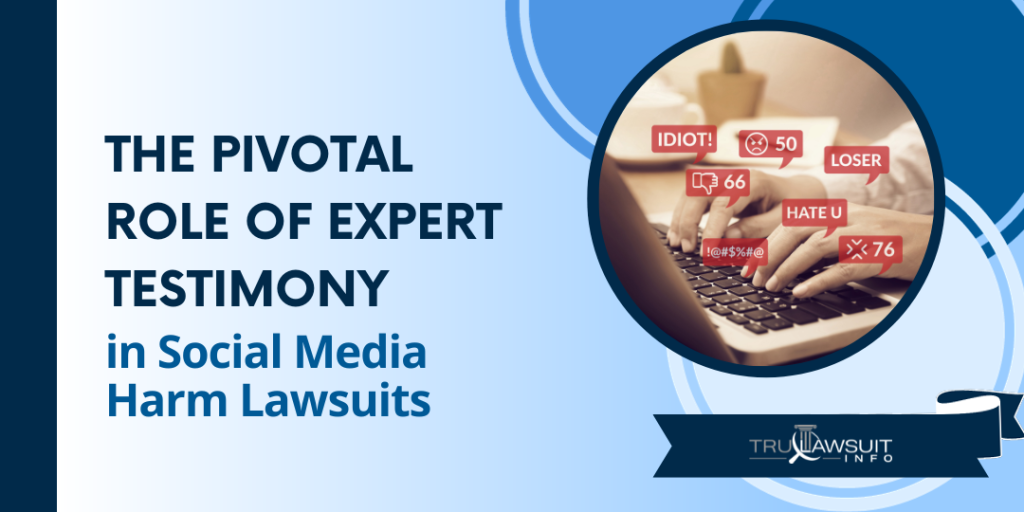
Expert testimony plays a pivotal role in these lawsuits.
Mental health professionals can provide insights into the plaintiff’s condition and help establish a link between social media harm and their mental health issues.
As an example, In one case involving online defamation, a psychologist testified about the plaintiff’s developed mood and eating disorders as a direct result of false information spread about them on social media platforms.
Previous Compensation Ranges
Historically, compensation amounts awarded in these cases vary greatly.
For instance, some plaintiffs have received millions while others only thousands.
This discrepancy is largely due to differences in jurisdictions and specific circumstances surrounding each case.
One notable example is when Facebook settled a social media class action lawsuit for $650 million concerning its use of facial recognition technology without user consent, leading to privacy invasion and causing distress among users.
Documenting Treatment Costs
It’s crucial that all costs related to social media and mental health treatment are documented.
This includes therapy sessions, medication costs, and even transportation to and from appointments.
These records serve as proof of the financial impact of the harm caused.
Consider an instance where a victim of online hate speech has been attending weekly counseling sessions.
Keeping track of these expenses can significantly support their case when seeking compensation for damages.
Legal Precedents: Successful Cases Addressing Mental Health in Social Media Harm
Landmark Cases Setting Precedents
The legal landscape has been marked by several landmark cases addressing mental health consequences in social media harm lawsuits.
These cases have set important precedents, shaping the way courts perceive and deal with such issues.
Here are some cases:
- In 2017, Michelle Carter was convicted of involuntary manslaughter after she encouraged her boyfriend to commit suicide via text messages.
- The case of Jane Doe vs. Facebook Inc., where a young woman sued Facebook for failing to prevent revenge porn, is another example.
These are just two instances among many that highlight the gravity of mental health consequences arising from social media misuse.
Impact on Future Litigation
The impact of these precedent-setting cases on future litigation cannot be overstated.
They serve as guiding stars for subsequent court proceedings involving similar issues.
For instance, the Carter case established that one can be legally held responsible for causing harm through words alone.
Similarly, the Doe vs. Facebook case underlined that social media platforms could be held accountable for content shared on their sites if it leads to harm.
This sets a clear path for future plaintiffs seeking justice for mental health damages caused by social media misuse.
Shaping Laws Around Social Media Harm
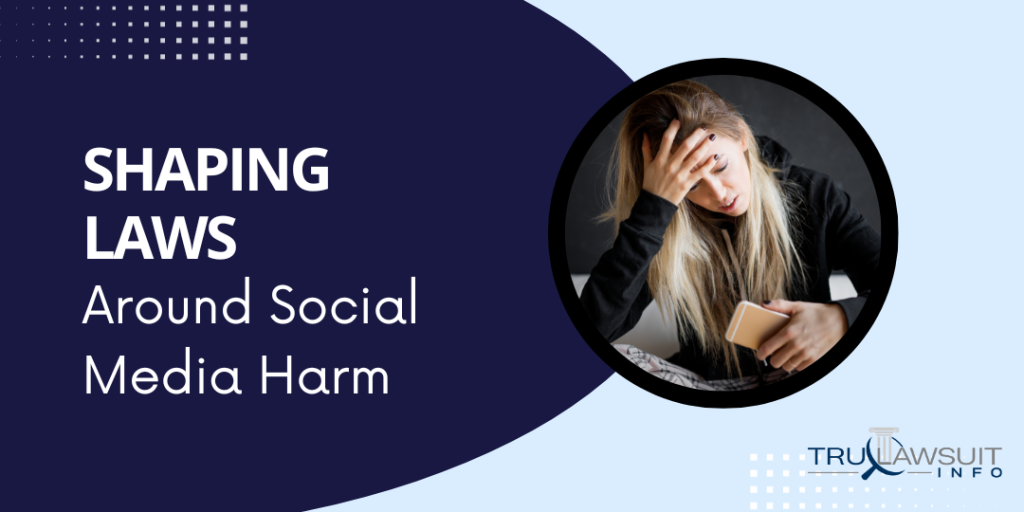
Court rulings in these landmark cases have played a significant role in shaping laws around social media harm.
They’ve highlighted loopholes in existing legislation and prompted lawmakers to take action.
Post the Carter verdict, Massachusetts enacted a law criminalizing suicide coercion.
Similarly, following Doe’s lawsuit against social media, more states are considering laws making revenge porn illegal and holding platforms accountable for such content.
These developments demonstrate how court decisions can lead to legislative changes addressing mental health consequences stemming from harmful online behavior.
Lessons Learned from Successful Lawsuits
Successful lawsuits addressing mental health consequences teach us several lessons about navigating this complex legal terrain:
- Gathering substantial evidence is crucial.
- It’s essential to establish a clear link between social media harm and mental health consequences.
- Engaging legal counsel experienced in this niche area can significantly tilt the odds in your favor.
These lessons serve as practical guidelines for victims seeking justice for mental health damages due to social media misconduct.
Influence on Public Awareness
Legal precedents have also played a pivotal role in raising public awareness about mental health issues related to social media harm.
High-profile cases often receive significant media attention, sparking widespread discussions about these pressing issues.
The Carter case, for instance, sparked a national conversation about cyberbullying and its devastating impact on mental health.
Similarly, Doe’s lawsuit against Facebook highlighted the distressing consequences of revenge porn, prompting more people to advocate for stricter laws against such practices.
Preventing Future Harm: Advocacy for Mental Health Awareness in Social Media
The mental health consequences of social media harm are a critical aspect that needs comprehensive understanding and effective legal strategies.
The integration of mental health experts into these lawsuits, the implementation of trauma-informed legal approaches, and the exploration of supportive therapies for plaintiffs are all pivotal steps toward achieving justice against social media algorithms.
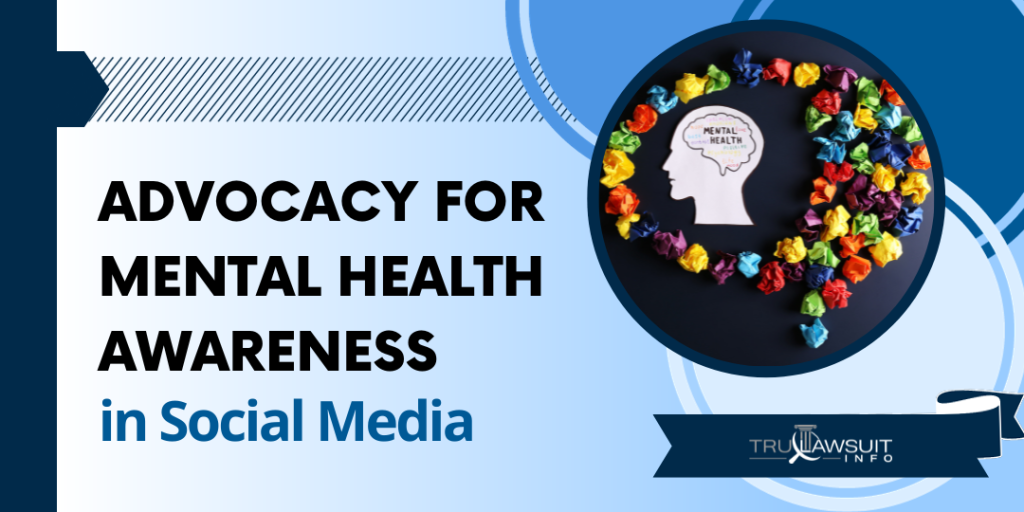
Moreover, recognizing PTSD as a valid outcome of such harm and advocating for adequate damages and compensation can further empower victims.
As we continue to navigate this digital age, it’s essential to raise awareness about the psychological toll caused by social media harm.
This advocacy can lead to more informed policies on online platforms and stronger protective measures for users.
Let us stand together in preventing future harm, supporting victims, and striving for a safer online environment.
Frequently Asked Questions
-
Mental health experts play an integral role in these lawsuits by assessing the emotional distress suffered by victims and providing professional insights into their condition.
-
A trauma-informed approach recognizes the impact of traumatic experiences on individuals’ lives.
It helps create understanding between parties involved in litigation and ensures that legal processes do not exacerbate any existing trauma.
-
Yes, severe instances of social media harm like cyberbullying can potentially trigger Post Traumatic Stress Disorder (PTSD) in victims.
-
Yes, various types of therapeutic interventions including counseling, cognitive-behavioral therapy (CBT), and other evidence-based treatments, may be beneficial for plaintiffs dealing with emotional distress from social media harm.
-
Damages awarded vary depending on individual circumstances but may include compensation for medical expenses related to mental health treatment, loss of earnings, and pain and suffering.

Attorney Jessie Paluch, founder of TruLawsuit Info, has over 25 years of experience as a personal injury and mass tort attorney, and previously worked as an international tax attorney at Deloitte. Jessie collaborates with attorneys nationwide — enabling her to share reliable, up-to-date legal information with our readers.
Legally Reviewed
This article has been written and reviewed for legal accuracy and clarity by the team of writers and legal experts at TruLawsuit Info and is as accurate as possible. This content should not be taken as legal advice from an attorney. If you would like to learn more about our owner and experienced injury lawyer, Jessie Paluch, you can do so here.
Fact-Checked
TruLawsuit Info does everything possible to make sure the information in this article is up to date and accurate. If you need specific legal advice about your case, contact our team by using the chat on the bottom of this page. This article should not be taken as advice from an attorney.
You can learn more about the Social Media Harm Lawsuit by visiting any of our pages listed below:
Here, at Tru Lawsuit Info, we’re committed to helping victims get the justice they deserve.
To do this, we actively work to connect them with attorneys who are experts in litigating cases similar to theirs.
Table of Contents
Tru Lawsuit Info is a reliable source of information about issues that may affect your health and safety, such as faulty products, data breaches, and environmental hazards.
Our team of experienced writers collaborates with medical professionals, lawyers, and advocates to produce informative articles, guides, and other resources that raise awareness of these topics.
Our thorough research provides consumers with access to reliable information and updates on lawsuits happening around the country. We also can connect consumers with attorneys if they need assistance.
Here, at Tru Lawsuit Info, we’re committed to helping victims get the justice they deserve.
To do this, we actively work to connect them with attorneys who are experts in litigating cases similar to theirs.
